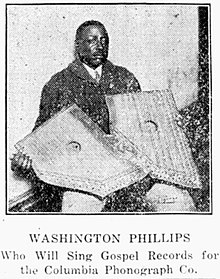Washington Phillips
| Washington Phillips | |
|---|---|
 |
|
| Background information | |
| Born |
January 11, 1880 Freestone County, TX |
| Died | September 20, 1954 (aged 74) Teague, TX |
| Genres | Gospel and gospel blues |
| Occupation(s) | Musician, songwriter, preacher |
| Instruments | Voice and zither |
| Years active | 1927–29 |
George Washington "Wash" Phillips (January 11, 1880 – September 20, 1954) was an American gospel and gospel blues singer and instrumentalist. The exact nature of the instrument or instruments he played is uncertain, being identified only as "novelty accompaniment" on the labels of the 78rpm records released during his lifetime.
He was born in Freestone County, Texas on January 11, 1880, the son of Tim Phillips (from Mississippi) and Nancy Phillips (née Cooper, from Texas).
People who knew him as an adult recalled him as standing about 5 ft 8 in (1.73 m) or 5 ft 9 in (1.75 m) tall, and being "stocky" or about 180 lb (82 kg); and that he was a snuff-dipper. He farmed 30–40 acres (12–16 ha) of land by the settlement of Simsboro near Teague, Texas. He was described as a "jack-leg preacher" – i.e. someone not necessarily an ordained minister, who would attend regular services at churches hoping for an opportunity to preach, but who would more often address spontaneous gatherings in the street, or set up their own storefront churches. He was a member of Pleasant Hill Trinity Baptist Church in Simsboro, but is also known to have attended the "sanctified" St. Paul Church of God In Christ, and the St. James Methodist Church, Teague. His song "Denomination Blues" criticizes sectarianism in organized religion and hypocritical preachers. His uncomplicated and sincere faith is summarised in the last two lines of that song:
It's right to stand together, it's wrong to stand apart,
'Cause none's going to heaven but the pure in heart. And that's all.
In 1927–29, he recorded 18 songs for Columbia Records in a makeshift recording studio in Dallas, Texas, under the direction of Frank B. Walker. Six of those songs were the first and second parts of three two-part songs, intended for opposite sides of one record. Four songs were unreleased at the time, and two are thought to have been lost.
...
Wikipedia
